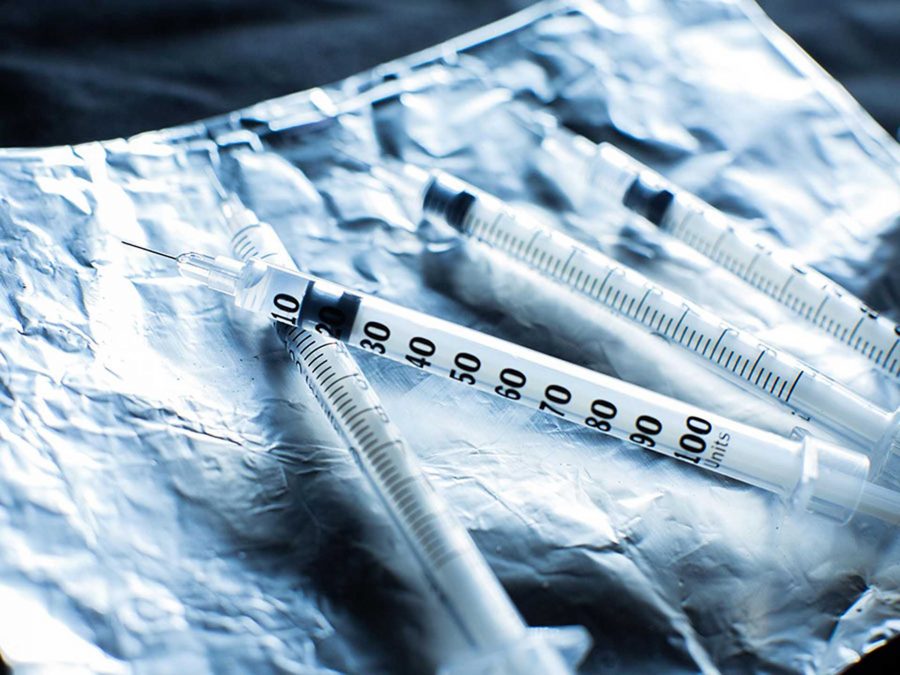Local governments allowed to opt into national opioid settlement
Elected officials for the City of Iowa City and Johnson County both approved having their government join the opioid settlement, which would potentially give both governments over $2 million to use towards opioid abatement and remediation.
More than 63 percent of the overdose deaths in 2015 involved an opioid, such as carfentanil. (Matt Anzur/ Scripps News/TNS)
April 11, 2023
Johnson County and Iowa City’s governments will receive millions after opting into an ongoing national opioid settlement in Ohio last week.
The Iowa City City Council and Johnson County Board of Supervisors voted last week to participate in the settlement to receive a total estimated $2.95 million.
The pharmacy chains Walmart, CVS, and Walgreens and drug manufacturers Allergan and Teva are involved in the lawsuit.
The litigation, which started in 2018, is part of an effort to hold companies responsible for the opioid epidemic, whether through the making or selling of opioids.
Iowa City Assistant City Attorney Jennifer Schwickerath said the settlements are the result of the U.S. state attorney general’s filing lawsuits against those involved with opioids.
“It kind of started with a number of state attorney generals that were considering or filing opioid litigation, and then it turned into a class action, and then additional states and municipalities joined in,” Schwickerath said.
As previously reported by The Daily Iowan, assuming there is total participation, the settlement would involve:
- Teva paying up to $3.34 billion over 13 years and providing either $1.2 billion of its generic version of the drug Narcan over 10 years to the groups or $240 million of cash in lieu of providing the product.
- Allergan paying up to $2.02 billion over seven years.
- CVS paying up to $4.90 billion over 10 years.
- Walgreens paying up to $5.52 billion over 15 years.
- Walmart paying up to $2.74 billion in 2023 within 6 years.
Besides the monetary penalties, all the companies involved would also be required to change parts of their operations. This includes Teva and Allergan changing how they market opioids and how pharmacies handle the opioids they order and sell.
RELATED: Iowa City could opt into $2.95 million national opioid settlement
In an interview with the DI, county attorney Nathan Peters said the estimate is based on if there’s 100 percent participation from local governments in Iowa, and other factors like attorney’s fees could change the final number. He added that the county would receive the money over the next 15 years.
This settlement comes after a different one was reached in 2021 with other companies involved with opioids. That case involved the pharmaceutical distributors McKesson, Cardinal Health, and AmerisourceBergen, as well as the manufacturer Janssen Pharmaceuticals, Inc. and its parent company Johnson & Johnson.
In the March 29 presentation, the assistant county attorneys outlined that the county was expected to receive approximately $2.95 million for the 2021 settlement. Of this, Peters said $600,000 was allocated in 2022, and the companies will give the remaining money through 2038.
Like the county, the City of Iowa City is also set to join the settlement, Schwickerath said. At its meeting on April 4, the city council approved Iowa City City Manager Geoff Fruin’s ability to opt into the national settlement.
The packet also states that the city council previously authorized Fruin to join the 2021 settlement.
When the city and county receive the money, the uses for that money will be restricted under the memorandum of understanding the state has for the settlement.
Johnson County Attorney Rachel Zimmermann Smith said the memorandum contained a list of specific activities that were approved in the settlement, with a focus on abatement.
Zimmermann Smith said a big focus has also been on the use of opiates and assisting those addicted to opiates as opposed to general substance abuse with the future abatement programs. The next step is to have county collaborators decide how to use the funding, she said.
“[Get] the stakeholders to get around the table from Iowa City and our service providers in the community and community members and talk about how best to use this money in a way that is allowed. That helps the people who need it most,” Zimmermann Smith said.
Zimmermann Smith said some of the possible uses in the memorandum are increasing medication-assisted treatment and other opioid treatment programs, funding prevention programs, and buying an overdose reversing drug like Narcan to have available when needed.




